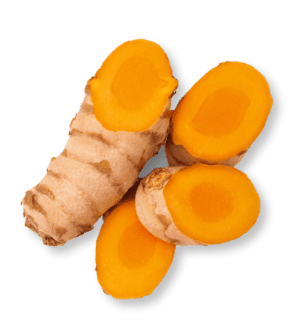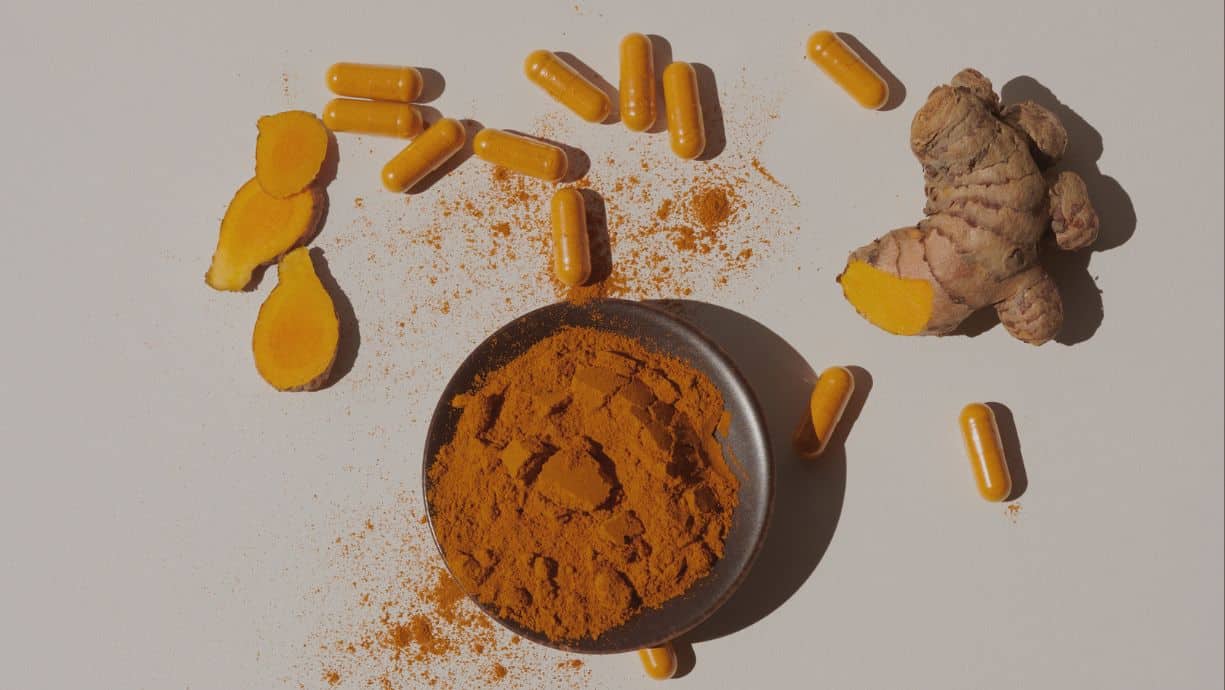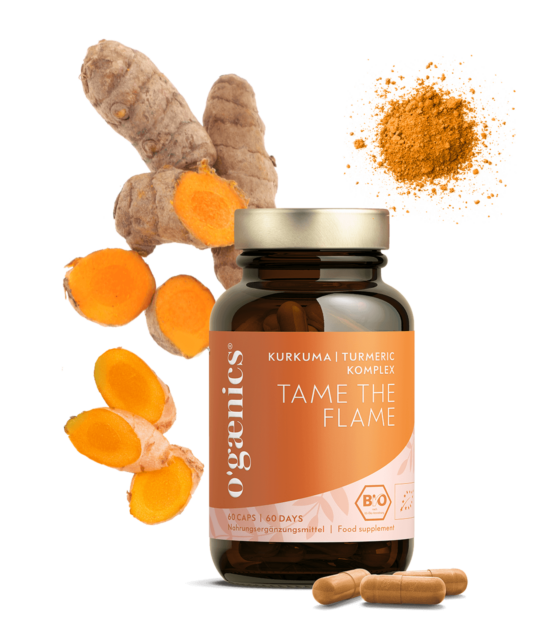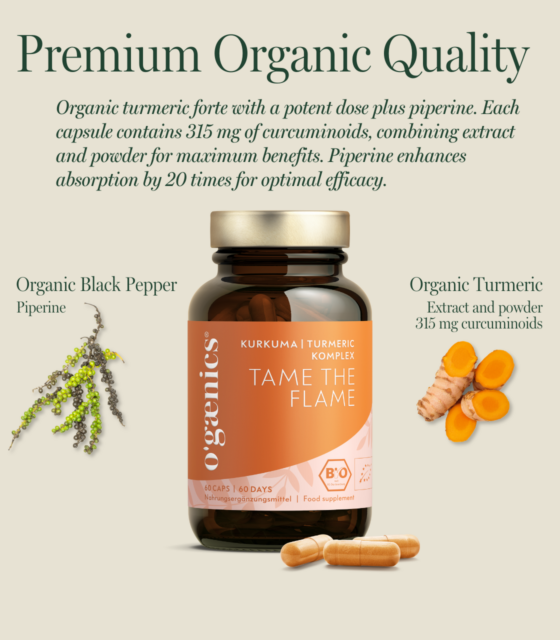IN THIS GUIDE
Science confirms what Eastern cultures have known for millennia.
Turmeric can really do your body good. But which effects have actually been proven in clinical studies – and how can you recognize a high-quality preparation? Here you will learn everything you need to know about the precious tuber.
What is turmeric?
This flowering member of the ginger family is grown primarily in India, where its underground-growing shoot axis, called a rhizome, is traditionally dried and then ground into powder. The earthy, tart powder is in almost every curry blend and gives the spice mixture its bright yellow color.
However, turmeric has a significance in Asia in the kitchen, as well as in cosmetics and on religious occasions. Indeed, there it is considered a symbol of peace, health, happiness, fertility, purity, prosperity and new beginnings. It is customary for Indian brides to apply a paste of this “Indian saffron” as a full body scrub before the wedding day, thereby naturally enhancing the beauty of the skin.
Incidentally, the turmeric plant is said to have been used as a remedy 4000 years ago. Since then, it has been one of the most popular medicinal herbs of Ayurveda with a wide range of effects. It is said to balance all three doshas, but especially kapha and pitta. It is also said to have antioxidant, antimicrobial, anti-inflammatory, immune-boosting, and digestive effects – and even anti-aging effects (17).
Some of these effects have already been scientifically confirmed.
What works in turmeric?

Curcuminoids
Curcuminoids are the phenols that give turmeric its bright yellow color. Curcumin is the best known of these and the most important in terms of quantity – along with demethoxycurcumin and bisdemethoxycurcumin. However, the term “curcumin” is often used synonymously with “curcuminoid”.
Curcumin makes up about 1-6% of the rhizome, depending on the grade of turmeric powder, and is considered the main active ingredient in turmeric root (15). But in reality, curcumin is merely one of almost 200 precious ingredients, each of which brings its own individual effects.
Scientists have found in studies that turmeric, from which the curcumin has been completely removed, still has incredible health benefits. This proves that, as is so often the case, it’s all about the big picture.
Essential oils
The essential oils in turmeric give it flavor, smell, and some health benefits. They consist mainly of sesquiterpenes, many of which are particular to the genus turmeric. The aroma of this spice comes mainly from α- and β-turmerones and aromatic turmerone (ar-turmerone). All essential oils together make up 3-7% of the powder.
Secondary plant substances
With its secondary plant substances – e.g. caffeic and ferulic acid – the plant wants to protect itself from predators. Nowadays, we know that many of them are also important for humans. Among other things, they inhibit inflammation or also have an antioxidant effect.
Minerals
Turmeric powder also contains iron, zinc, copper, manganese, calcium and some magnesium – so the golden tuber is also a great mineral supplier.
Scientifically proven health benefits of turmeric
In recent years, turmeric has already experienced a real boom. But which effects can really be scientifically proven? Curtain up for the results of sound scientific studies!
Antioxidant
Oxidative stress is considered one of the main causes of disease and aging. Behind this is an excess of free radicals. These are highly reactive molecules with unpaired electrons. Free radicals tend to react with and damage fatty acids, proteins or DNA.
Smoking, alcohol consumption, an unbalanced diet, sports, environmental toxins or even the sun, among other things, contribute to the formation of free radicals. Antioxidants then protect your body from these free radicals. Curcumin is one such antioxidant that can neutralize free radicals (17).
Antibacterial
In vitro studies have already shown that curcuminoids have also been shown to inhibit the growth of pathogenic bacteria, but at the same time had no negative effects on the major benign bacterial species that colonize the human gut (18).
Anti-inflammatory
Inflammation is actually very important and healthy immune responses of the body. However, it becomes a concern when these inflammations become chronic and the immune system even attacks the body’s own tissue.
Scientists now believe that chronic low-level inflammation may play a role in the development of certain diseases. These include
- Heart disease
- Diabetes (12)
- Cancer (4)
- Metabolic syndrome
- inflammatory bowel disease (6)
- inflammatory joint diseases (7)
- Psoriasis /dandruff (5)
- Respiratory diseases
- Alzheimer’s disease
- Depression (14)
Thus, research findings to date suggest that chronic inflammation, oxidative stress, and most chronic diseases are closely linked. Curcumin suppresses numerous molecules that trigger such inflammation. This could give curcumin a key role in the prevention and treatment of chronic inflammatory diseases. However, very high doses are required to achieve a medicinal effect (20).
Microbiome-promoting
Curcumin has prebiotic properties that allow it to modify the intestinal flora and support the connection between the intestine and the immune system.
In a controlled study, one group of participants received turmeric with piperine, one group received curcumin with piperine, and another group received a placebo. The original number of bacterial species detected in the subjects ranged from 172 to 325 bacterial species.
In the placebo group, the number of species decreased by 15 percent overall during the study period. In contrast, there was a modest 7 percent increase in species among subjects treated with turmeric. The best result was in the subjects taking curcumin. Among them, in fact, the number of species detected increased by an average of 69 percent (19).
If you want to learn more about gut health, probiotics and the microbiome, read on here:
- How menopause affects your gut health
- Optimize your gut health with synbiotics
- Skin problems? The gut-skin axis is behind it
- The crucial role of the microbiome for gut health
- Irritable bowel syndrome: Vitamin D can banish flatulence
- How the microbiome influences our health and ageing
- Bloated belly while traveling: how to prevent it
- What you should look for in a probiotic
- What can I expect when I take probiotics?
Supporting liver health
Studies suggest that turmeric and the ingredient curcumin in particular could be good for the liver. In people with non-alcoholic fatty liver disease, curcumin has been shown to help improve liver function. These studies have shown that curcumin has anti-inflammatory properties and can help protect the liver from damage caused by various stresses.(21,22,23,24) Incidentally, an overloaded liver first manifests itself in the form of fatigue. You can find out more about this in our article “Tired all the time? Maybe your liver is whispering for help“.
Digestive
Smooth digestion is the key to a good well-being. In studies, turmeric was able to alleviate the subjects’ digestive complaints and thus have a calming effect on the gastrointestinal tract. Symptoms such as bloating and flatulence improved, for example.
An 8-week double-blind, randomized study of 79 adults with digestive symptoms also demonstrated that turmeric extract can reduce digestive problems such as abdominal pain, reflux, and diarrhea (2).
Even the symptoms of irritable bowel improved in 87 percent of the turmeric subjects, but only in 53 percent of the placebo group (9).
Curcumin has also been shown by another study to increase gallbladder contraction, stimulating the secretion of bile. Bile helps your body better digest ingested fats (1). Thus, turmeric indirectly regulates fat metabolism.
Anti-depressant
Recent studies with turmeric see a link between depression and chronic inflammation. The assumption here is that the two reinforce each other.
This was demonstrated in a controlled study. Sixty people with depression were divided into three groups. One group took an anti-depressant, another group took 1 gram of curcumin, and the third group took both an anti-depressant and curcumin.
Interestingly, the improvement at the end of the six weeks was comparable in all three groups. All test subjects tolerated the curcumin very well. This study thus provides the first clinical evidence that curcumin can be used as an effective and safe alternative for people with depressive moods (14).
Preventive for cardiovascular diseases
Turmeric has a positive effect on the so-called triglycerides. These are fats in your blood that provide energy to your organs. But in excess, they also increase your risk of cardiovascular disease and pancreatic inflammation (10).
Cholesterol is also an important parameter for health, which is also influenced by turmeric. Your body does need cholesterol – for example, to build cell membranes or produce hormones. But a distinction is made between “good” and “bad” cholesterol. “Bad” LDL cholesterol, in fact, can be deposited on the walls of blood vessels, which can lead to atherosclerosis, a heart attack or stroke. In one study, turmeric was able to significantly reduce “bad” LDL cholesterol – and thereby raise the level of “good” HDL cholesterol (3).
Who needs turmeric as a dietary supplement?
Turmeric is a valuable all-round talent and in principle suitable for everyone to increase well-being. But some people still benefit more than others from the gold tuber.
If you like hearty food
High-fat food is indeed heavy on the stomach. Because turmeric stimulates the bile, it is therefore ideal for lovers of the hearty. Also, if your intestines are pinching and squeezing away from sumptuous meals, turmeric could help you.
If you are prone to cardiovascular disease
Maybe there’s a family history of this, or maybe you’re just a typical candidate for it…. If your blood cholesterol level is already elevated, turmeric can lower the “bad” LDL cholesterol and raise the level of “good” HDL cholesterol. This makes the golden tuber especially valuable for you.
If you are older than 55
Turmeric is rich in antioxidants that can counteract the increasing inflammatory processes in old age. In addition, the tuber helps to meet the increasing demand for nutrients. Because your body produces less stomach acid and digestive enzymes over time, it absorbs vitamins and minerals less easily.
If you suffer from inflammation
With the help of inflammation, your body eliminates pathogens and repairs damage. So you don’t have to be afraid of inflammation. Nevertheless, they should not get out of hand or permanently (chronically) burden your body. Turmeric can also provide helpful support here.
When you smoke
To get rid of the toxins from stimulants such as alcohol and tobacco, the liver works at full speed. A clinical study showed that smokers who consumed 1.5 g of turmeric for 30 days reduced the carcinogenic compounds present in their bodies. To help you stay healthy as a smoker, turmeric is a great preventative measure for you.
-
Tame The Flame
Organic Turmeric Complex Premium high dose of organic turmeric extract and powder, one capsule/day!54,90 €1.256,29 € / kg
The correct dosage
There are no minimum quantities for admission. There is probably no toxic dose either – at least no clinical data can be found for this. So far so good.
However, the European Food Safety Authority (EFSA) recommends, for example, that a maximum of three milligrams of curcumin per kilogram of body weight be taken daily. If you weigh 65 kilos, that makes 195 mg. But science shows that this dose does not necessarily make sense. Almost all scientific studies work with much higher doses of up to 2,000 mg.
| Application studied | Dose of curcumin used |
| Gallbladder contraction | 20 mg |
| Digestive complaints | 500 mg |
| Cholesterol values | 1,890 mg |
| Rheumatoid arthritis | 1,200 mg |
| Psoriasis / psoriasis | 400 mg |
| Irritable bowel syndrome | 2,000 mg |
| Fat metabolism disorder | 1,890 mg |
| Diabetes | 1,500 mg |
| Knee pain | 1,000 mg |
Can you overdose on turmeric?
Quite clearly, we don’t know. There is no current scientific evidence on this yet. Therefore, turmeric should never be dosed higher than in the scientific human studies that are currently already available.
Important co-factors for uptake
Nutrients always work as a team. This is also the case with turmeric. Since turmeric is hardly water soluble, your intestines absorb it from food only to a small extent. At the same time, enzymes break down the substance within a very short time. So, in order for you to take in larger amounts of turmeric, it needs to be combined with two other substances:
Piperine
Black pepper extract is a bio-enhancer for turmeric – it inhibits the breakdown of curcumin and promotes absorption through the digestive tract.
Fat
Because curcumin is fat soluble, your body can absorb it better when combined with a meal that also contains healthy fats.
By the way, there are no antagonists that worsen the bioavailability of turmeric.
Turmeric powder or turmeric extract: which is better?
Are extracts more effective – or natural powders? It all depends on your objective. After all, both can make sense!
Turmeric powder
If you’re looking for the holistic effects of turmeric, a powder is the way to go. Turmeric powder contains only one to six percent curcumin, but more than 200 other ingredients that can also provide certain effects. Due to the so-called entourage effect, the active ingredients presumably also influence each other positively – an advantage over extracts.
When choosing your product, always look for organic quality, because the roots from conventional farming are often heavily contaminated with toxins. You also need to pay attention to the curcumin content, which can vary depending on the quality of the powder.
At Ogaenics, we incorporate a high-quality organic turmeric powder with 5 percent curcumin content in our organic multivitamin Mrs. Do-It-All 55+ and in our Tame The Flame Turmeric Complex.
Curcumin /Turmeric extract
Extracts are usually standardized to the sought-after curcuminoids. The best extracts should, of course, be certified organic and thus definitely free of harmful substances. In addition, you should also pay attention to the curcurmin content here, which can vary greatly and is usually reflected in the price. So always compare products based on the nutritional table before you buy.
The premium organic extract we process at Ogaenics in Tame The Flame Organic Turmeric Complex has an extraction factor of 50:1 and a crucuminoid content of 95 percent.
Combination of powder and extract
Clever products simply combine a good powder and high-dose curcumin as an extract in one capsule, thus offering the benefits of both forms. At Ogaenics, you’ll find both in our Tame The Flame Organic Turmeric Complex. So you have the valuable spectrum of active ingredients of the tuber and a high curcumin content in just one capsule per day.
This is what you should look for when buying
Turmeric supplements can be good for your body – if you make the right choice for you. These are five aspects you should pay attention to.
Organic quality
Conventionally grown turmeric unfortunately always contains pesticides and other toxins. And even if the residues are within the legally permissible limits, they are present and can burden your body.
Clean formula
In a turmeric supplement, you should only find turmeric, turmeric extract, piperine as an enhancer, and a capsule shell on the ingredient list – that’s it. Because unnecessary additives such as magnesium stearate or silicon dioxide, which can still be found in many supplements, are not good for your body.
Piperine
Black pepper extract increases the bioavailability of curcumin by 20 times. This is how you fully exploit the great potential of the superfood. So make sure it is included, ideally in organic quality for absolute purity.
Daily dose
There are many products on the market that seem cheap at first, but have very low doses per capsule. If you then have to take up to eight capsules a day for a good effect, it becomes exhausting, more expensive than expected and also impractical in everyday life.
Therefore, always check before buying how many capsules should be taken for your desired dose of curcumin. If the daily dose consists of one capsule, it is easiest to integrate the supplement into your routine – you take it in the morning and then go about your daily routine as usual.
Laboratory analyses
In order for you to take turmeric with confidence as a dietary supplement, laboratory analysis should guarantee you freedom from residues and authenticity.
Can turmeric cause side effects?
Turmeric is a food that is usually very well tolerated by the body. Higher doses of turmeric can nevertheless sometimes cause stomach irritation, diarrhea or mild nausea in sensitive people. Then you should just reduce the dose.
Who should avoid turmeric supplements?
For pregnant women, dietary supplements with turmeric are unsuitable – namely, they can trigger premature labor. To prevent this from happening, you should avoid it during pregnancy.
In addition, data are lacking for the effects of golden tuber on the child. Therefore, turmeric preparations are also not recommended during breastfeeding.
Because curcuminoids stimulate the liver to produce more bile acid, people with liver disease or gallstones should also avoid turmeric.
1) The effect of curcumin and placebo on human gall-bladder function: An ultrasound study .
7) The therapeutic potential of curcumin: A review of clinical trials ,
9) Randomized double blind study of Curcuma domestica Val. for dyspepsia
11) Curcumin Extract for Prevention of Type 2 Diabetes ,
13) Active principles and median lethal dose of Curcuma longa Linn.
14) Efficacy and safety of curcumin in major depressive disorder: a randomized controlled trial.
15) The Essential Medicinal Chemistry of Curcumin.
17) Antioxidant and anti-inflammatory properties of curcumin.
18) Curcumin: A natural derivative with antibacterial activity against Clostridium difficile.
20) Curcumin, inflammation, and chronic diseases: how are they linked?




 No products in the cart.
No products in the cart.